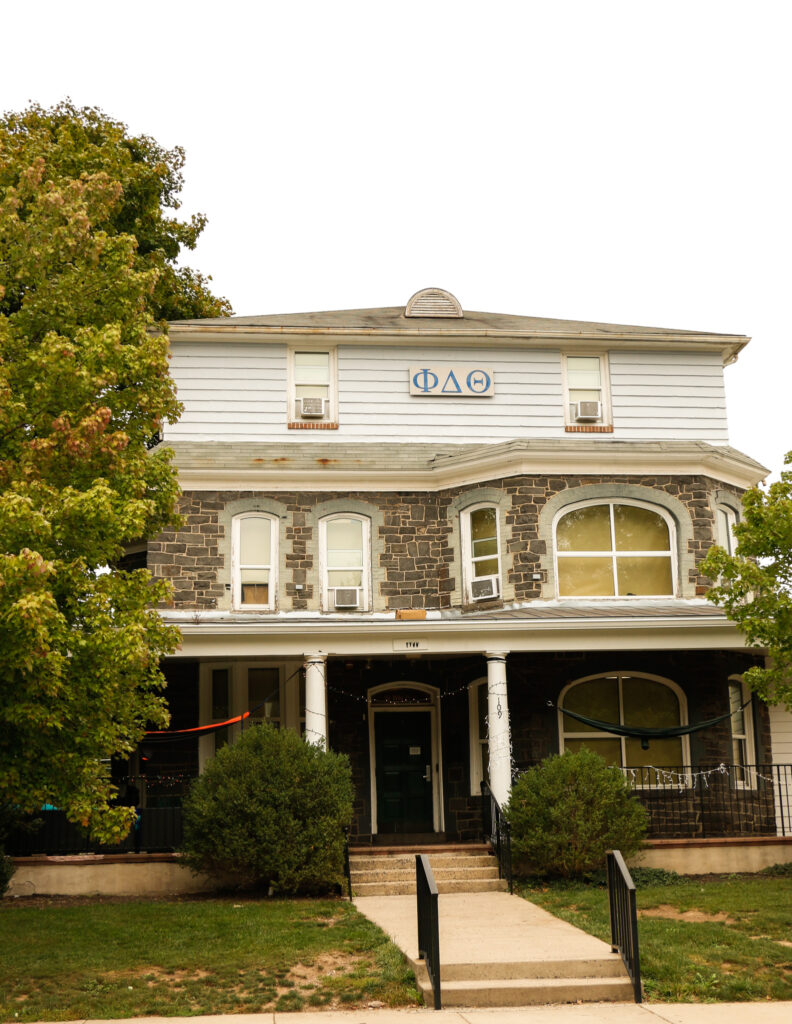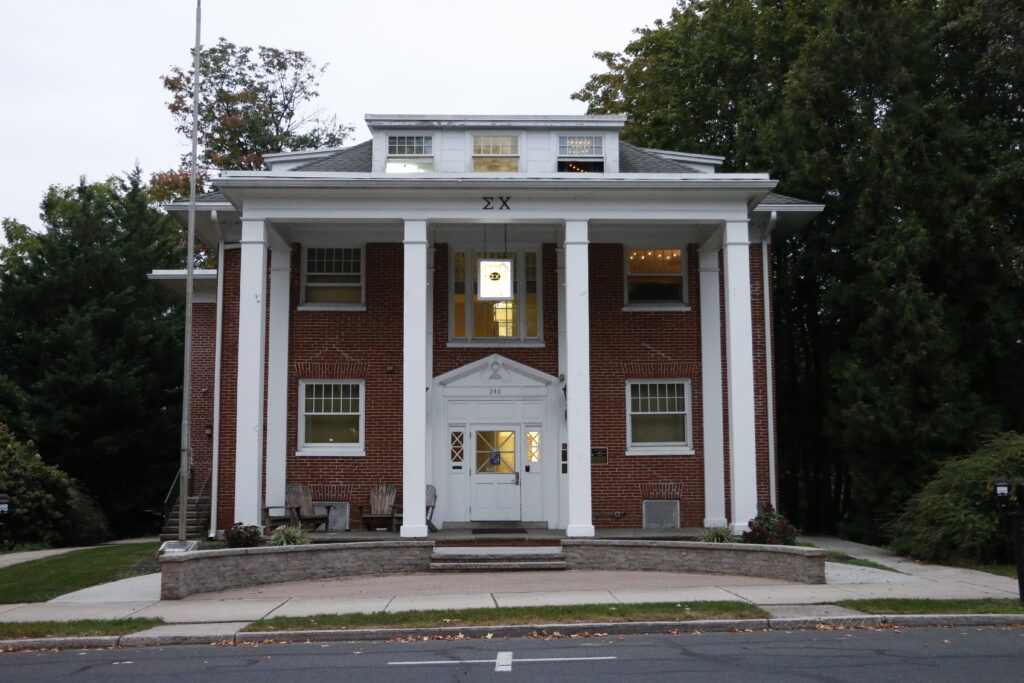Campus Poll Finds Discrepancies Among Students Regarding Perception of Greek Life
By Nicole DeJacimo, Managing Editor
A recent campus survey conducted by The Gettysburgian shows that the perception of Greek life varies widely between students involved and not involved in a Greek organization: 76 percent of Greek students believe that Greek life has had a positive effect on campus while 64 percent of students who never joined Greek life find it to have a negative effect on campus. The three students who left Greek life all described it as a negative experience and those who are not yet eligible, most of whom are first-years, are almost evenly split.
This campus-wide poll was conducted to understand how students, Greek or non-Greek, perceive Greek life at Gettysburg College; 292 students completed the survey, 11.6 percent of the total fall 2021 student population of 2,518. Gettysburg College recognizes a total of 17 Greek organizations, seven sororities, and nine fraternities. This semester, fraternity participation decreased from 33 percent of the total degree-seeking population in the fall of 2019 and 2020 to 28 percent this fall, while sorority participation increased from 33 percent, also in the fall of 2019 and 2020, to 35 percent this fall.
Many in Greek life cited “friendship” and “community” as reasons for joining their organizations. Others said it was their way of getting more involved on campus and having an outlet for service projects. One white woman in the class of 2022 said, “I went to a service-based all-girls high school and loved that kind of environment, and joining Greek life allowed me to keep that comfort and familiarity along with the emphasis on volunteering and service work.”
Numerous students from the classes of 2023 and 2024 explained that the past year left them feeling isolated and disconnected from campus. They believed that Greek life was the way to remedy that.
“With COVID, I felt isolated and [dis]connected to the Gettysburg community,” said one white, sophomore woman. “This was my way to branch out and meet girls that were motivated and kind, so I joined because a lot of people seemed to be in it for the same reasons as me.”
For students who chose not to join a Greek organization, they cited high costs, social pressures, and safety for not rushing, but most said the idea never interested them. For some student-athletes, joining a Greek organization is against team policy. Among the responses for why students did not want to join a fraternity or sorority, the word “toxic” appeared in 17 different responses by non-Greek students.
“I decided not to rush for a few reasons. 1) Too expensive and I don’t drink so social dues would be unfair. 2) Culture of drinking. 3) Rampant sexual assault. 4) Culture relies on conformity and regulations. I don’t think true friendship should have rules that were set by people years ago,” said a Latina, sophomore woman, summing up the majority of responses for why students did not join a fraternity or sorority. Others expressed feeling uncomfortable with the idea of “paying for friendship.”
Self-identified queer students explicitly expressed that they would not feel comfortable being queer in a Greek organization or would not feel accepted. Fifteen non-binary students completed the survey. Of those 15, only one was a member of a Greek organization. The other 14 wrote that they felt like they would not be accepted because they are non-binary.
Among every respondent who never joined a fraternity or sorority, 17 mentioned sexual assault, 11 mentioned rape, and 80 mentioned parties when asked what comes to mind when they think about Greek life.
The Relationship Between Greek and Non-Greek Students
“Greek life’s greatest issue is our relationship with the rest of campus,” said Alpha Chi Rho (Crow) President Matt Fellini ’22. “There is a disconnect between how Greek life believes it relates to campus versus how the rest of campus views Greek life.”
Of the 97 Greek respondents, 83.6 percent agreed on some level that Greek students associate themselves with non-Greek students. Only ten Greek students disagreed on some level, and six remained neutral on the matter. In contrast, of the 151 non-Greek respondents, just 53.6 percent agreed on some level that Greek students associated themselves with non-Greek students while 34.4 percent disagreed and 11.9 percent were neutral.
“There is a disconnect between how Greek life believes it relates to campus versus how the rest of campus views Greek life.”
-Matt Fellini ‘22
There is a significant difference between the perceived association between Greeks and non-Greeks. Some chapter presidents recognized that and offered the following solutions:
“One thing we are trying to improve for our organization is facilitating more of a bond between Greek and non-Greek organizations on campus,” said Delta Gamma President Jerrienne Abercrombie ’22.
She emphasized that it’s more effective to have all students join in on Greek philanthropic events, such as Anchor Splash, which, she said, in previous years only Greek students participated.
Inclusivity and Recruitment
Data from the Office of Student Organizations and Greek Life and the Office of Institutional Analysis shows that while 21.4 percent of the student body is domestic students of color, only 13 percent of Greek life students fall into that category.
Fellini explained that Crow’s recruitment tries to pull from various groups on campus, “rather than any particular social circle. Because of this, we have reached a wide variety of circles which attracts a diverse pool of new members.”
Crow has 75 percent domestic white students, 22 percent domestic students of color, and 3 percent international students. Fellini also emphasized the importance of diversity in majors, political beliefs, socioeconomic backgrounds, religious beliefs, and geographic origin.
Alexander Stillman ’22, president of Alpha Tao Omega (ATO), detailed the values his fraternity considers when recruiting new members.
“Our goal is to find new members that embody the qualities and characteristics of being a STUD: Scholarship; Tone and temperament; Usefulness; Do/Doing/Done,” said Stillman, who explained that these core values of ATO make sure their members leave a positive mark on the community.
Greek Impact on the Community
Despite the pandemic, some organizations are maintaining philanthropic efforts on and off campus. Last year, Sigma Chi raised $53,000 for the Huntsman Cancer Foundation and they look forward to raising more money this year.
“Through our philanthropy events on campus, like Anchor Splash and our silent auction with SAE,” said Abercrombie, “we hope to raise money to help support the funding of Delta Gamma’s five schools that provide educational access for those in [the blind and visually-impaired] community.”
Of the 97 Greek students who completed the survey, 76.2 percent of them believe that Greek life has had some sort of positive influence on campus. 13.4 percent of them stayed neutral on the matter and 10.3 percent said they believe the influence is a negative one. Of those ten who found it negative, eight are women, one is non-binary, and one is a man. In comparison, 64.2 percent of non-Greek students believe that Greek life’s influence at Gettysburg College is negative on some level, while only 11.9 percent of them believe there is some sort of positive influence. The rest of the respondents, 23.8 percent of non-Greek students did not have an opinion or did not see a more positive or negative impact.
Remembering, or ignoring, the history of Gettysburg Greek life, as Coppola mentioned, could be part of this divide between Greek and non-Greek students. In 2017, an underage Greek student flipped his car while driving under the influence after his fraternity violated the sober monitor policy, the wrist-banding policy, and served alcohol to a minor. In the spring of 2018, a student found a picture in the 1980 yearbook of Bob Garthwait wearing a Nazi uniform at a Hogan’s Heroes themed fraternity party. In 2019, the College released ten reports about Gettysburg Greek organizations that violated the law by hazing their incoming members. Just last year, the College suspended Phi Gamma Delta for three years for violating COVID-19 protocols and for numerous “conduct concerns” and suspended Delta Gamma for one year for violating COVID-19 protocols.
“It is our responsibility to reach out to organizations on campus to build relationships with them and produce spaces that students feel comfortable in.”
-Giacomo Coppola ‘22
“I think of the partying and close-knit communities, but these communities largely promote unhealthy habits and can often bring out the worst in people because of the ‘power’ these people think they have as members of Greek life,” said one non-Greek, white man in the class of 2022.
For the first-years who are not yet eligible, they answered whether or not they planned to join a Greek organization and why.
“I do not think so. Greek life is heavily associated with illicit activities such as underage and frequent drinking, drugs, and sexual assault. Additionally, the Greek life party scene has been a nationwide contributor to the rapid spread of disease (COVID-19 in particular) on college campuses, and Greek life also has a history of excluding and even instigating hate crimes against members of the LGBTQA+ community,” said one non-binary, white first-year. “Despite the philanthropy and service aspects of fraternities and sororities, I find no real appeal.”
President of Sigma Chi Giacomo Coppola ‘22 commented on the barriers that some students perceive about Greek life.
“Our members might not sense the restrictive culture but others still do,” said Coppola. “Therefore, it is our responsibility to reach out to organizations on campus to build relationships with them and produce spaces that students feel comfortable in.”
He continued to recommend ways for Greek life to be more inclusive including Greek students attending various club meetings, co-sponsoring events with other organizations, and continuing to educate themselves about the history of their organizations.
“Nothing will change so long as we refuse to be proactive,” said Coppola.
This article originally appeared on pages 4–6 of the November 1, 2021 edition of The Gettysburgian’s magazine.



November 10, 2021
“In the spring of 2018, a student found a picture in the 1980 yearbook of Bob Garthwait wearing a Nazi uniform at a Hogan’s Heroes themed fraternity party.”
A wonderful chance to educate students about how moral and social values/norms change over time was wasted by Janet Riggs. Hogan’s Heroes was a very popular as a new program, in reruns and in syndication. The premise of the program was how stupidly inept the Nazis were. In 2018, Hogan’s Heroes was still broadcast via over the air TV by a Sinclair station in Harrisburg.
Values change. It was wrong to condemn Bob Garthwait in 2018 for behavior that was accepted in 1980. It would be wrong to condemn the values of students today. But I would suggest that those same students attempt to understand the differences between yesterday and today.
I won’t go on how Ms Riggs’ response affected alumni donations.
November 11, 2021
Hi Doug, how did her response affect alumni donations?